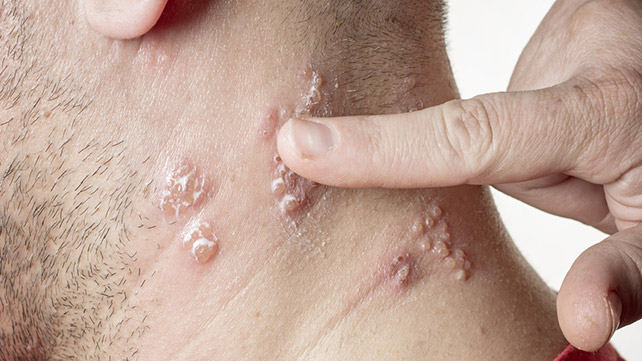Your skin is your body’s largest organ. It has many different functions, including covering and protecting your body. It helps keep germs out. But sometimes the germs can cause a skin infection. It often happens when the germs enter your body through a break, cut, or wound on your skin. Other skin infections can happen in places where the skin rubs together, especially if the area is moist. Infections can also happen when you have a poor blood supply to an area of your body or if your immune system is weakened because of another disease or a medical treatment.
Some skin infections cover a small area on the top of your skin. Other infections can go deep into your skin or spread to a larger area.

What are the four types of skin infections?
There are four primary types of skin infections: bacterial, viral, fungal, and parasitic. These infections can cause a variety of symptoms, including redness, itchiness, sores, skin irritation, and
To diagnose a skin infection, your healthcare provider will do a physical exam and ask about your symptoms. You may have lab tests, such as a skin culture. This is a test to identify what type of infection you have, using a sample from your skin. Your provider may take the sample by swabbing or scraping your skin or removing a small piece of skin (biopsy). Sometimes providers use other tests, such as blood tests.
How are skin infections treated?
The treatment depends on the type of infection and how serious it is. Some infections will go away on their own. When you do need treatment, it may include a cream or lotion to put on the skin. Other possible treatments include medicines and a procedure to drain pus.

The treatment depends on the type of infection and how serious it is. Some infections will go away on their own. When you do need treatment, it may include a cream or lotion to put on the skin. Other possible treatments include medicines and a procedure to drain pus.
How Are Skin Infections Treated?
Ones caused by bacteria usually can be cured though some bacteria have become resistant to the drugs and are harder to kill. Medication or prescription creams can stop most fungal infections, and there are several ways to treat viruses. Your doctor may recommend antiviral medicines, or they might need to remove skin growths. In other cases, your symptoms may go away on their own.
Skin Parasites
Tiny creatures can burrow into your skin and feed or lay eggs, which can cause red, irritated, itchy skin. are common parasites, especially in children. They affect the scalp and pass easily from person to person. Other skin parasites are mites (scabies) and hookworms, called “creeping eruption.” Special creams, lotions, or shampoos can get rid of them, and they don’t often cause long-term problems.
Rosacea
If you notice blotches or flushing across your cheeks, nose, chin, or forehead, you might have this skin condition. Sometimes, small pimple-like bumps form and blood vessels get more visible. Usually, it starts after age 30, then gets redder and more constant. Many things can trigger rosacea or make it worse, including drinking and eating spicy foods, stress, and There’s no cure, but treatments can control the symptoms.
Spider veins
Also called broken capillaries, these are tiny blood vessels, located close to the surface of the skin, that get larger and more visible. The result is blotchiness and uneven skin tone on areas like the legs and face. Spider veins have many causes and are twice as common in women. They’re not harmful, but you can have them treated if you don’t like how they look.
Drinking Alcohol
When you drink, especially if you have one too many, your face can flush and look blotchy. And if you have a hangover the next day, the dehydration will make any redness worse. If your skin gets very red when you imbibe, you may have alcohol flush syndrome, which is caused by an enzyme problem (it’s common in people of East Asian descent). Or you could have rosacea, and alcohol triggers your symptoms.
Over-Exfoliating
Whether it’s with a chemical peel or a scrub, exfoliation removes dead skin cells and leaves your skin looking brighter and refreshed. But doing it too often or too aggressively can make your face redder, make skin problems worse, and cause dark spots to show up. Ask a dermatologist about the best way to exfoliate your skin type.
ALSO VISIT: ALCOHOL LIVER DISEASE
